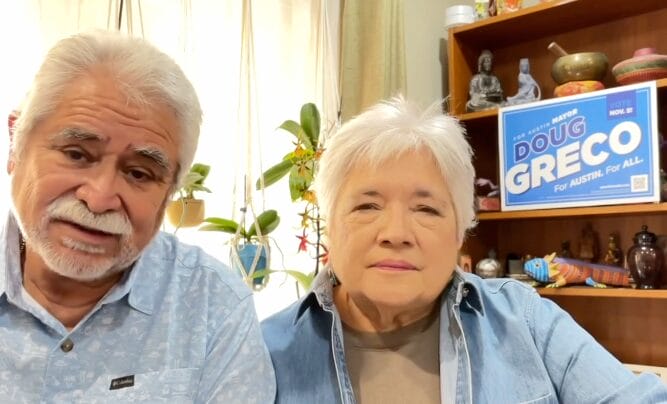Doug Speaks on The Tragedy That Pushed Him to LGBTQ+ Advocacy
Audio Transcript
Hon. Rev. Dr. Jayme Mathias:
One of the first people that I got to know when I moved to Austin — and that was a long time ago, 1995 — was an organizer for Austin Interfaith, who knew this family from the double funeral. They have a few words to share with us. He is a community organizer, activist, and author, and I understand now a mayoral candidate in the city of Austin. Let’s invite him to share a few words about that incident from 2011. Please welcome Doug Greco.
Doug:
Thank you, Father Jayme. This may be tough because I feel like things are coming full circle. I came to Austin in the late ’90s and was a high school teacher at Johnston High School, in Southeast Austin. Go-Rams! Now Eastside Early College. I was a teacher for 10 years, then a community organizer with Central Texas Interfaith, eventually becoming the director. It’s a coalition of churches and schools. I got to know Father when he was at Cristo Rey, and we did some trainings together.
In 2011, I picked up the newspaper — we were working in Dove Springs on community safety — and I read about this murder. I saw the picture, and it had been 10 years since I was a teacher, but I said to my partner at the time, “I know who this is.” She was a former student of mine. I taught her in ninth grade, and it really shook me.
I’m a member of the LGBTQ community, and I was working on economic justice issues, immigration reform, and funding for schools, but we weren’t working on LGBTQ issues. So it really shook me.
I just want to read one paragraph because it’s about the funeral you mentioned. This is from an article I read in the paper that made me reflect on what I wanted to do in the next phase of my life.
Hon. Rev. Dr. Jayme Mathias:
Before you read that, what are you reading from? Is this a book?
Doug:
Yes, I wrote a book about my vision for the next phase of the LGBTQ rights movement. I used this story and my connection to Austin and the murders. I hadn’t stayed in touch with Norma since teaching her, but teachers always remember the faces and names of their students. The book is called To Find a Killer: The Homophobic Murders of Norma and Maria Hurtado and the LGBT Rights Movement.
We knew who the murderer was right away. He was apprehended the next day, but I wanted to look deeper at the issues that cause these types of hate crimes. Let me read this paragraph.
“Two white caskets sat at the altar of Cristo Rey Catholic Church on Austin’s east side on April 25, 2011. According to the reporter, Claudia Grisales of the Austin American-Statesman, over 150 friends and family attended the Hurtado funeral. Many wore t-shirts that read, ‘Like a rainbow, gone too soon, but never forgotten.’ Brother Jamie Luthias, who eventually became a school board member in Austin, delivered the sermon. His words were affirming and inclusive: ‘Some take Bible verses out of their context to reject others based on sexual orientation.’”
I thought, “Wow, this man has courage. He’s standing in a Catholic church and preaching inclusion.” It really moved me, and I decided to make some changes in my life. I wanted to get involved in the LGBTQ movement.
I sold everything I owned, except my book collection — 1,200 books — and I moved to California, where the LGBTQ movement was at its peak. I went to graduate school at Princeton, earned a master’s in public policy, and another in writing from USC. Eventually, I became the Program Director for Equality California, the largest statewide LGBTQ organization. I worked up and down the state, collaborating with Dolores Huerta, the renowned civil rights leader who co-founded the farm workers movement with Cesar Chavez. She was on our board.
What I wanted to figure out was how the issues of homophobia, religious intolerance, race, and economic status all intersect. This book reflects that.
Most of the book draws on my papers from graduate school, but it also shares my experiences working with Equality California. I came back to Austin seven years ago and started organizing again, mostly with interfaith groups. Recently, I stepped down to run for mayor. This book reflects on how religion, sexual orientation, gender identity, economic status, and immigration status intersect and how we can prevent these kinds of murders from happening again.
Thank you for leading and for the work you’ve done. It really helped me think about my path forward. I want to give you a copy of the book.
Hon. Rev. Dr. Jayme Mathias:
Thank you, Doug.
Doug:
I want to read a short description from the book. Father Jayme, your words and actions are part of this story and mine. Amen.
Hon. Rev. Dr. Jayme Mathias:
Thank you, Doug.
Holy Family, we always check our politics at the door, but we also love to give anyone running for office, or anyone who has family or friends running for office, a chance to speak about the issues.
So, Doug, what are some of the issues that ignited the fire in your belly to run against an incumbent for mayor of Austin?
Doug:
It’s the issues I mentioned — specifically, economic justice, what people can earn and live with a dignified wage, investments in education, workforce development, affordable housing, and civil rights. I believe those are all connected.
If you are from a working-class background, part of the LGBTQ community, an immigrant, or from a community of color, those issues intersect and can create health and economic disparities. I want to address those and how they affect our communities.
Hon. Rev. Dr. Jayme Mathias:
Wow.
